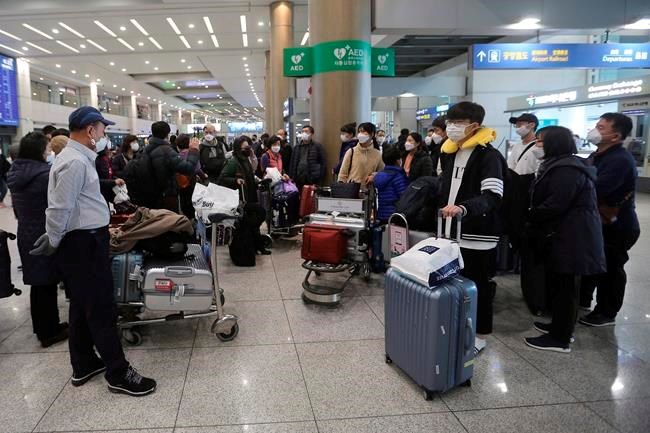Hugh Ji had been looking forward to returning home to South Korea with his Canadian wife and two of their friends for a trip that included stops in Seoul and a visit to Jeju island. But when he saw the mounting number of novel coronavirus cases in his homeland, he didn't hesitate to postpone the two-and-a-half week vacation.
The 34-year-old Calgary resident said his decision was firm, even when he was initially told he'd have to pay hundreds of dollars to rebook.
"It's not about the money," he said. "It's health issues."
The rash of new coronavirus cases appearing in Italy, Iran, South Korea and Japan over the past week has prompted Canadians like Ji to rethink their travel plans, even as travel industry professionals call for calm.
Foreign Affairs Minister Francois-Philippe Champagne has said Canadians should think carefully about where they and their families are planning to travel for spring break in light of the virus's spread overseas.
He suggested Wednesday that people examine the online travel advisories posted by Global Affairs Canada before leaving for their vacations, though he noted the federal government can't predict whether the coronavirus will spread.
But Julia Kent, director of public and government affairs for CAA Atlantic, says aside from a few specific regions, there haven't been a lot of issues.
"Unless you have plans to go to China, you should probably proceed as planned," she said in a phone interview this week. The CAA describes itself as one of Canada's largest leisure travel agencies. "Generally speaking, when you compare coronavirus to the flu, it is far less widespread and less impactful."
Still, many people are expressing concerns.
In Edmonton, two Catholic schools cancelled spring break trips to Japan and two other schools cancelled the Italian portion of a European trip after cases spiked in the north of the country.
Lori Nagy, a spokeswoman for the school board, said the cancellations were prompted by worries that students could be exposed to the virus or be subjected to lengthy quarantines when they try to return.
"We do not feel it is appropriate to send our students and staff into an area that has already been affected by the coronavirus when the (World Health Organization) has indicated that the spread seems inevitable, and containment processes are potentially unable to ensure the safety of all our travellers," she wrote in an email.
Students at a high school in Gatineau, Que., who were expected to leave Wednesday for a trip to Japan also had their trip cancelled at the last minute, according to Christian Laforest, a spokesman for the Draveurs school board.
On its website, the tour company that was organizing the school's Japan trip, EF Educational Tours, said tours to China and now northern Italy have been switched to other destinations, and the company "will continue to implement measures that extend beyond those recommendations for the safety and support of our travellers."
For Ji, rebooking wasn't as easy as he'd hoped. He said he was first told he'd have to pay fees of $500 to cancel his trip, or $150 to rebook, plus the difference in ticket price.
But by end of Tuesday, Air Canada updated its policy to add airports in northern Italy and South Korea to the list of destinations where travellers can rebook without penalty. Ji has since changed his dates to June, free of charge.
Global Affairs Canada has advised against non-essential travel to China and issued a Level 2 health advisory for South Korea, Iran and northern Italy, which urges travellers to take precautions, such as avoiding large crowds, or avoiding travel if they have underlying health conditions. (The government already advises against non-essential travel to Iran for security reasons.)
Kent suggests looking to those warnings for guidance. She said most major travel providers and travel insurance companies would issue full refunds only in the case of a government advisory against non-essential travel, meaning those who wish to travel elsewhere may be stuck paying for some or all of their trips.
There has been a lot of attention on Yokohama, the Japanese port city where the cruise ship Diamond Princess was docked with 3,500 passengers under quarantine. More than 690 people were sickened on the ship, and three died.
Bari Golin-Blaugrund, senior director strategic communications for Cruise Lines International Association, said the industry has adopted enhanced protocols to address the virus.
"No person, no matter if they are passenger or crew, will be allowed to board any of our ships if they have travelled in or through the affected areas ... China, and that includes Macau and Hong Kong, within the previous 14 days prior to embarkation," she said.
Cruise Lines International Association added that member ships are required to have medical facilities on board, and that by the time passengers and crew reach the ship, they have in many cases "gone through one or more health screenings already — especially those travelling to meet their ships via plane."
While the association said it did not have any information about booking levels, it said that "history suggests that when there are world events like these, there is generally a level of discomfort about travel."
This report by The Canadian Press was first published Feb. 27, 2020
— With files from Kevin Bissett in Fredericton, N.B.
Morgan Lowrie, The Canadian Press



